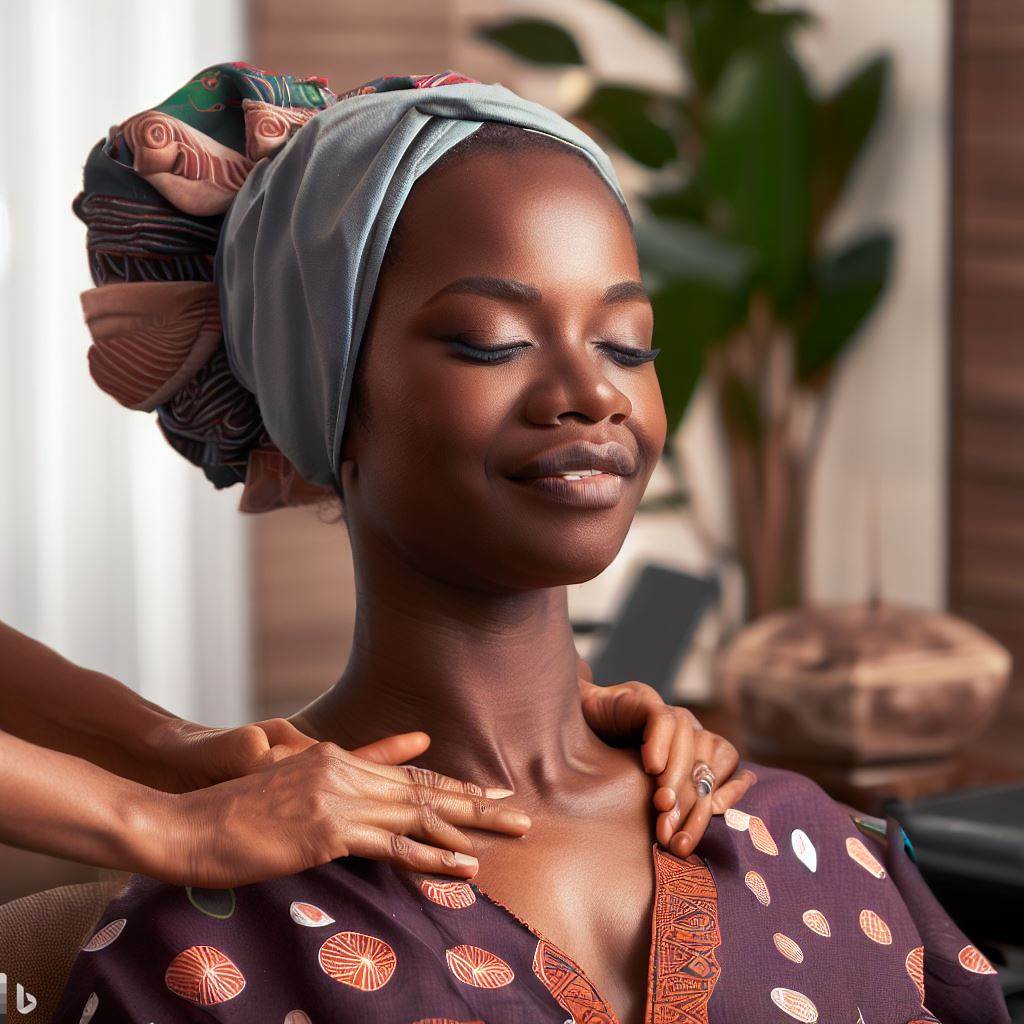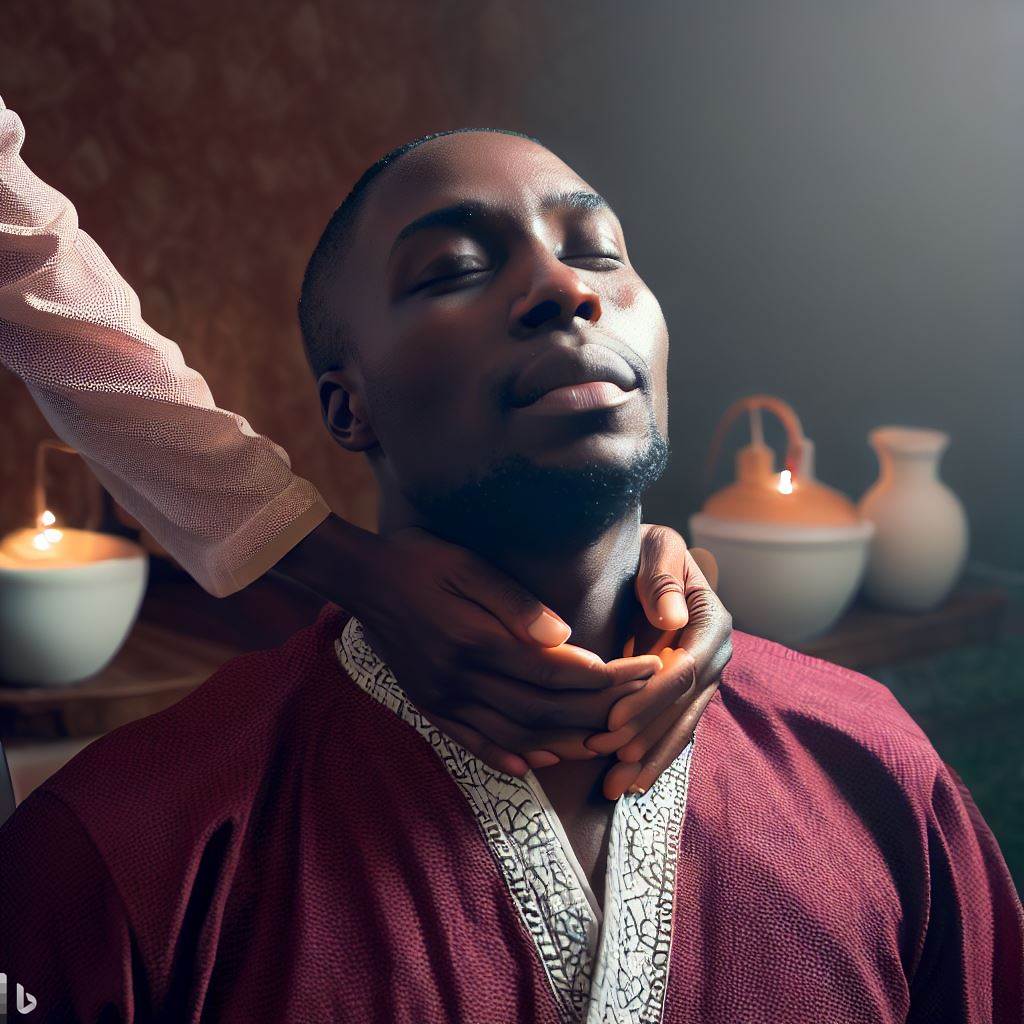Introduction
Massage therapy holds great significance in Nigeria, influencing physical and mental well-being.
Thesis Statement
Culture is pivotal, molding how Nigerians embrace and perceive massage therapy.
Main Points to be Discussed in the Blog Post
- Traditional Healing Techniques: Impact on massage practices.
- Cultural Beliefs: Influence on body touch and comfort levels.
- Communication Styles: How cultural norms affect therapist-client interactions.
- Modernization vs. Tradition: Balancing new trends with cultural heritage.
- Perception Shifts: Cultural acceptance and awareness about massage therapy benefits.
- Training and Education: Cultural aspects integrated into massage therapy courses.
- Accessibility: Culture’s role in the availability and affordability of massage services.
- Future Outlook: Embracing cultural diversity for a more holistic approach to massage therapy in Nigeria.
Nigerian Cultural Background
Brief Overview of Nigeria’s Diverse Cultures and Traditions
Nigeria, known as the “Giant of Africa,” is a country rich in diverse cultures and traditions. With over 250 ethnic groups, each with its own unique practices, Nigeria is a true melting pot of cultural diversity.
From the Hausa-Fulani in the north to the Yoruba in the west and the Igbo in the east, Nigeria is a land of vibrant traditions.
The Hausa-Fulani, for example, are predominantly Muslims and uphold Islamic practices in their daily lives.
On the other hand, the Yoruba are known for their colorful festivals, masquerades, and artistic expressions, while the Igbo people have a strong sense of community and value their indigenous religion.
This cultural diversity extends to the various languages spoken in Nigeria, with over 500 languages recognized.
English, however, serves as the lingua franca, enabling communication among the different ethnic groups and facilitating cultural exchange.
Significance of Touch and Physical Contact in Nigerian Culture
In Nigerian culture, touch and physical contact hold great significance. Physical contact, such as handshakes, hugs, and pats on the back, are seen as essential elements of interaction and communication.
It is a way to establish rapport, convey respect, and show warmth and friendship.
When it comes to massage therapy, the importance of touch is magnified. Massage is regarded as a powerful healing practice, not only for the body but also for the mind and spirit.
It is believed to provide relief not only from physical pain but also from emotional and spiritual burdens.
In Nigerian culture, touch is seen as a way to connect with others and promote well-being. It is used in various contexts, from family settings to traditional healing practices.
For instance, elders often bless younger ones by placing their hands on their heads, symbolizing wisdom, protection, and bestowing blessings.
Importance of Holistic Practices in Nigerian Healthcare Traditions
Nigerian healthcare traditions have a strong emphasis on holistic practices, treating the whole person rather than just isolated symptoms.
This approach recognizes the interconnection between the physical, mental, and spiritual aspects of an individual’s well-being.
Massage therapy aligns perfectly with this holistic approach. It provides a means to restore balance and harmony within the body, promoting overall health and well-being.
In Nigeria, traditional healers often incorporate massage techniques into their practices to address physical ailments and restore energy flow.
The belief in the interconnectedness of the body, mind, and spirit extends to the use of herbal remedies, spiritual rituals, and traditional therapies alongside massage.
This comprehensive approach aims to address not only the physical symptoms but also the underlying spiritual and emotional imbalances.
In fact, Nigerian culture is a tapestry of diverse traditions and practices.
The significance of touch and physical contact, coupled with the importance of holistic healthcare, has deeply influenced massage therapy in Nigeria.
Understanding this cultural context is vital for providing effective and culturally sensitive massage treatments.
Read: Incomes and Earnings: Reality of Massage Therapists in Nigeria
Traditional Nigerian Massage Techniques
The history and origins of traditional massage techniques in Nigeria
Nigeria has a rich history of massage therapy, dating back centuries. Traditional massage techniques were passed down through generations in Nigerian communities.
These techniques were influenced by various cultures, including Yoruba, Igbo, and Hausa. Ancient Nigerian tribes believed in the healing power of touch and used massage to treat ailments.
Massage was seen as a holistic practice, addressing physical, mental, and spiritual well-being.
The specific methods used in traditional Nigerian massage therapy
Traditional Nigerian massage therapy incorporates a variety of techniques and tools. One common technique is the use of palm pressure to manipulate muscles and release tension.
Deep tissue massage is often performed using the knuckles, elbows, and forearms.
Stretching and joint manipulation are also integrated into traditional Nigerian massage therapy. Special oils and herbal remedies are often used to enhance the massage experience.
The principles and beliefs behind these techniques, relating them to Nigerian culture
Nigerian massage therapy is rooted in the belief that the body has its own innate healing abilities. Massage practitioners aim to restore balance and harmony between the body, mind, and spirit.
Traditional beliefs hold that massage can remove blockages and promote the flow of energy. Massage is seen as a way to connect with one’s ancestors and honor Nigerian heritage.
Traditional Nigerian massage techniques have had a significant impact on the culture and practice of massage therapy in Nigeria.
These techniques have been passed down through generations, with each tribe adding its own unique elements to the practice.
Nigerian tribes have long recognized the healing power of touch and developed various techniques to address physical and spiritual well-being.
Ancient Nigerians believed that massage could not only relieve physical pain but also promote mental and emotional balance.
Traditional Nigerian massage therapy is guided by the belief that the body possesses its own innate healing abilities, and massage practitioners serve as facilitators in the healing process.
Massage sessions often incorporate cultural rituals and the use of special oils and herbal remedies. These practices aim to enhance the massage experience and promote overall well-being.
By honoring Nigerian heritage and connecting with one’s ancestry, massage becomes more than just a physical therapy; it becomes a sacred practice.
In short, traditional Nigerian massage techniques have had a profound impact on the culture and practice of massage therapy in Nigeria.
The history, methods, and principles behind these techniques all contribute to a holistic approach to healing and wellness.
By understanding and appreciating the rich heritage of traditional Nigerian massage, we can better recognize the valuable contributions it brings to the field of massage therapy in Nigeria and beyond.
Read: The Everyday Life of a Nurse in Nigeria: What to Expect
Influence of Cultural Beliefs on Massage Therapy
Cultural Beliefs and Customs
Cultural beliefs and customs have a significant impact on the perception and acceptance of massage therapy in Nigeria.
Traditional Nigerian values and practices shape how massage therapy is viewed and received by individuals.
For example, some cultural beliefs emphasize the importance of touch and physical contact for overall well-being.
As a result, massage therapy is often seen as a natural and effective way to promote healing and relaxation.
Additionally, customs such as communal living and extended family structures play a role in the acceptance of massage therapy.
The emphasis on communal support and interconnectedness contributes to the belief that massage therapy can benefit not just individuals but entire communities.
The cultural significance of touch and physical connection also extends to the therapeutic value of massage therapy.
Nigerians often perceive massage as a holistic practice that combines physical, mental, and spiritual healing.
This integrated approach aligns with cultural beliefs that view health as a balanced state of being.
Association with Spirituality and Healing Practices
In Nigerian culture, massage therapy has long been associated with spiritual and healing practices.
Many traditional healers incorporate massage techniques into their rituals and ceremonies. These healers believe that massage can help restore balance and harmony in the body and spirit.
Massage therapy is often seen as a tool for connecting with the divine and invoking spiritual healing.
Thus, individuals seeking spiritual guidance or healing are more likely to consider massage therapy as a complementary practice.
This association between massage therapy and spirituality has deep roots in Nigerian culture.
It reflects the belief in the interconnectedness of the physical, mental, and spiritual aspects of human existence.
By incorporating massage therapy into their healing practices, traditional healers honor and uphold cultural traditions.
Furthermore, this association contributes to the overall acceptance and value placed on massage therapy in Nigerian society.
Read: The Path to Becoming a Surgeon in Nigeria
Role of Cultural Rituals and Ceremonies
Cultural rituals and ceremonies play a vital role in incorporating massage therapy into Nigerian culture.
During traditional ceremonies, such as weddings or births, massage therapy is often employed to promote relaxation and well-being.
These rituals serve as a social and cultural context for massage therapy, reinforcing its importance in Nigerian society.
Moreover, cultural events provide individuals with the opportunity to experience massage therapy in a familiar and accepted setting.
By integrating massage therapy into these rituals, it becomes deeply rooted in cultural practices and customs.
Furthermore, the inclusion of massage therapy in ceremonies fosters a sense of community and unity.
It brings people together, transcending cultural boundaries and enhancing cultural preservation.
Through these rituals and ceremonies, massage therapy not only maintains its relevance but also continues to evolve within the Nigerian cultural context.
In review, cultural beliefs and customs significantly influence the perception and acceptance of massage therapy in Nigeria.
The belief in the therapeutic value of touch, association with spirituality, and incorporation into cultural rituals highlight the deep connection between massage therapy and Nigerian culture.
Understanding these influences is crucial for both practitioners and individuals seeking massage therapy in Nigeria.
Read: Massage Therapy Regulations and Laws in Nigeria Explained

Modernization and Western Influence
Impact of Globalization and Westernization on Massage Therapy in Nigeria
Globalization and Westernization have greatly influenced massage therapy practices in Nigeria. Increased exposure to Western cultures has led to the integration of Western massage techniques.
Nigerians have embraced modernization, resulting in changes in their perception and acceptance of massage therapy.
The globalization of massage therapy has opened doors for cross-cultural exchange of techniques and practices.
Western influence has introduced new technologies and equipment into Nigerian massage therapy.
Nigerians now have access to a wider range of techniques and therapeutic methods. The Western influence has also brought about changes in the education and training of massage therapists.
Nigerian therapists now receive training in Western massage techniques to meet the demands of a globalized market.
Globalization has led to the evolution of Nigerian massage therapy, combining traditional and Western practices.
Nigerian massage therapists have adapted Western techniques to cater to the specific needs of the Nigerian population.
Western influence has also influenced the perception of massage therapy as a legitimate profession in Nigeria.
There is now a growing recognition and acceptance of massage therapy as a valuable healthcare practice.
The integration of Western massage techniques has also led to the development of specialized treatment options. Nigerians now have access to a variety of massage therapies targeting specific health concerns.
Read: Occupational Therapy Schools: Where to Study in Nigeria
Integration of Western Massage Techniques into Nigerian Practices
The integration of Western massage techniques has enriched Nigerian massage practices. Western methods have expanded the range of therapeutic options available to Nigerian clients.
Nigeria is now able to offer a more comprehensive approach to healing through massage therapy. Integration of Western techniques has allowed Nigerian therapists to cater to a broader client base.
Publish Your Professional Profile, Business or Brand
Showcase your expertise, gain trust, and boost visibility instantly on Professions.ng.
Publish NowNigerian massage therapists are now able to address a wider range of health conditions and concerns. The integration of Western techniques has also improved the efficacy of Nigerian massage therapy.
Combining traditional and Western practices has resulted in more effective treatment outcomes.
Nigerians have experienced greater relief and improved overall well-being through the integration of Western techniques.
The integration of Western massage techniques has also improved the professionalism of Nigerian therapists.
Nigerians now adhere to international standards and practices, enhancing the quality of their services. The integration of Western techniques has elevated the status of massage therapy in Nigeria.
Nigerian therapists are now seen as skilled professionals, contributing to the healthcare industry. The integration of Western techniques has also created opportunities for Nigerian therapists abroad.
Nigeria’s expertise in massage therapy has led to a global demand for Nigerian therapists, making them highly sought-after.
Changes in Perception and Acceptance of Massage Therapy due to External Influence
External influence, especially Westernization, has positively impacted the perception and acceptance of massage therapy in Nigeria.
Nigerian society now acknowledges massage therapy as a legitimate and valuable form of healthcare.
Western influence has shifted the perception of massage from a luxury to an essential component of self-care.
Nigerians now recognize the numerous physical and mental health benefits of massage therapy. There has been a significant increase in the demand for massage therapy services in Nigeria.
Nigerians actively seek out massage therapy for stress relief, pain management, and overall well-being.
Nigerian society now acknowledges massage therapy as a viable alternative to conventional medicine.
Nigerians are more open to exploring holistic approaches to healthcare, including massage therapy. There has been a cultural shift towards embracing and incorporating massage therapy into daily life.
The influence of Western practices has dismantled previous stigmas associated with massage therapy in Nigeria.
Massage therapy is now accessible and accepted by people from various social and cultural backgrounds.
External influence has also prompted Nigerian policymakers to recognize and regulate the massage therapy industry.
Efforts are being made to ensure the safety and professionalism of massage therapy practices in Nigeria. The external influence on massage therapy in Nigeria has ultimately elevated its status and value in society
Read: Nursing and the Future of Healthcare in Nigeria
Challenges and Opportunities
Challenges faced by massage therapists in Nigeria due to cultural factors
- Lack of awareness and understanding of the benefits of massage therapy
- Religious and conservative beliefs that may view touch-based therapies as inappropriate
- Limited acceptance and recognition of massage therapy as a legitimate profession
- Traditional healing methods and practices that compete with modern massage therapy
- Societal stigma and misconceptions associated with the nature of the profession
Opportunities for growth and development in the industry by leveraging cultural heritage
- Integration of traditional Nigerian massage techniques and practices into modern therapies
- Collaboration with local healers and traditional medicine practitioners to combine knowledge and expertise
- Promotion of massage therapy as a cultural experience and tourist attraction
- Empowerment of local communities by providing training and job opportunities in the industry
- Development of specialized massage therapies catering to specific cultural needs and preferences
The importance of cultural competency and sensitivity in providing effective massage therapy services in Nigeria
- Understanding cultural norms, values, and traditions to ensure respectful and appropriate treatments
- Adapting techniques and approaches to meet the cultural preferences and comfort levels of clients
- Effective communication and building trust with clients from diverse cultural backgrounds
- Addressing cultural barriers that may affect the accessibility and acceptance of massage therapy
- Continued education and professional development to enhance cultural competence and sensitivity
Conclusion
In this blog post, we explored the impact of culture on massage therapy in Nigeria. Culture plays a significant role in shaping the practices and techniques of massage therapy in Nigeria.
From traditional techniques to the use of local herbs and oils, culture deeply influences the massage experience.
The cultural beliefs and values surrounding touch and healing contribute to the uniqueness of Nigerian massage therapy.
Clients and massage therapists must recognize and respect these cultural influences.
By understanding the impact of culture, we can enhance communication and ensure a more effective and meaningful massage experience.
In summary, culture is not just a mere backdrop, but an integral part of Nigerian massage therapy. It is essential to embrace cultural diversity and appreciate the rich traditions behind massage practices.
As we continue to explore the world of massage therapy, let us remember to honor and embrace cultural differences.
How can we further promote the understanding and integration of culture in massage therapy practices?




